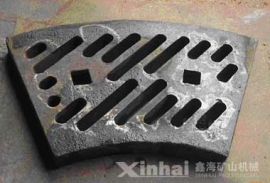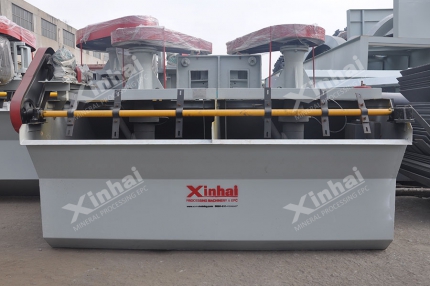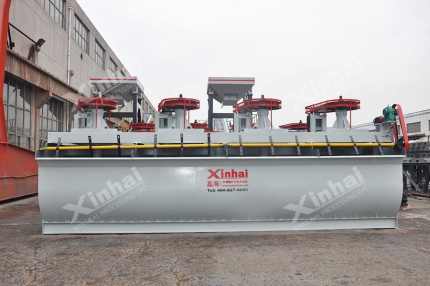Pegmatite-type lithium ore is an important resource of lithium material. In pegmatite spodumene deposits, spodumene can coexist with silicate minerals such as feldspar, quartz and chlorinolite. These minerals have similar surface physicochemical properties and are more difficult to separate. Flotation is a common method for separating pegmatite spodumene. There are many factors which will influence the lithium mineral flotation process. You can learn about these factors from the article. What’s more, you can also know more about the flotation process and flotation agents of pegmatite lithium.

Use the table of contents below to navigate through the guide:
01Factors affecting pegmatim lithium mineral flotation
The factors affecting pegmatim lithium mineral flotation are mainly divided into two aspects: grinding fineness, mud and floating impurities.
1. Grinding fineness
During the flotation process of pegmatim pedumene, the coarse granular minerals of pedumene are more difficult to float. When the particle size of spoduroxene is about 0.2mm, its flotation recovery rate is low. The flotation granularity of general pegmatite spopyroxene is below 0.15mm. The specific value should vary with the granularity of spodumene embedding.
2. Mud and floating impurities
When the surface of pegmatite lithium pyroxene ore is contaminated by weathering or the pollution of ore mud. In production practice, sludge removal or floating impurities should be set before spodumene minerals flotation.

023 kinds of pegmatite-type lithium mineral flotation processes
At present, the flotation process adopted by pegmatite lithium pyroxene can be divided into three kinds: flotation process, pre-desludge flotation process, and stage grinding flotation process.
1. Direct flotation process
The lithium mineral embedding of pegmatite spopyroxene is uneven. Some lithium minerals may drain with the mud. To recover this lithium mineral, a direct flotation process can be used. Antiflotation and removal of sulfide minerals such as micite and quartz. Then the spodumene flotation, can get better spodumene flotation effect.
2. Pre-removal sludge flotation process
Pegmatite spodumene is easy to produce ore mud, which affects the flotation of target minerals. It mainly affects the viscosity of mineral pulp, consumes a large number of agents, pollutes the surface of spodumene mineral particles, and activates gangue minerals. Therefore, for the complex spodumene ore with high degree of weathering and serious argelification, the pre-sludge removal-flotation bildumene process can be selected.
3. Stage grinding flotation process
Pegmatite spoduroxene cloth is uneven. Lithium minerals of different particle size also differ in floatability. The coarse-grain pedumene with a particle size of 74~38μm is better buoyant. In the gangue minerals, the fine grain float below 38μm is better. Therefore, the overgrinding of gangue minerals can be reduced by the flotation of the stage grinding stage, and the flotability of gangue minerals can be reduced.

03Flotation reagent for pegmatite-type spodumene
1. Spodumene collector
Spodumene flotation collectors mainly include the use of single collectors and combined collectors. Single collectors can be divided into cationic collectors for reverse flotation and anionic collectors for positive flotation. Cationic collectors are generally amine collectors. Dodecylamine is a commonly used collector, mainly used in roughing operations for reverse flotation of gangue minerals such as quartz and mica. Anionic collectors are generally fatty acid and its soap collectors, including oleic acid, sodium oleate, naphthenic acid soap, oxidized paraffin soap, etc.
The spodumene combined collector can play a synergistic effect of various agents to obtain the ideal flotation capacity index. Common combination collectors include sodium oleate + oxidized paraffin soap, oleic acid + naphthenic acid + fuel oil, oxidized paraffin soap + oximic acid, oxidized paraffin soap + naphthenic acid soap and so on.
In addition to the above commonly used collectors, there are also a large number of new collectors for spodumene flotation, such as YOA-15, YZB-17, and other chelating collectors.
2. Spodumene modifier
Since the floatability of spodumene and gangue minerals is similar in pegmatite-type spodumene, it is necessary to increase the floatability difference between spodumene and gangue by adding modifiers. The adjustment agent of spodumene flotation is mainly "tri-alkali", including sodium carbonate, sodium hydroxide and sodium sulfide. In addition, there are also new inhibitors such as disodium EDTA.

The above is about pegmatite type lithium mineral flotation process. In actual production, it is necessary to conduct beneficiation tests on specific ore samples to further determine the actual production process and pharmaceutical system, avoid unsuitable process flow leading to unsatisfactory indicators, and reduce economic losses and resource waste.


 marketing@ytxinhai.com
marketing@ytxinhai.com  0086 13810327080
0086 13810327080 






































































































 CHAT
CHAT MESSAGE
MESSAGE






